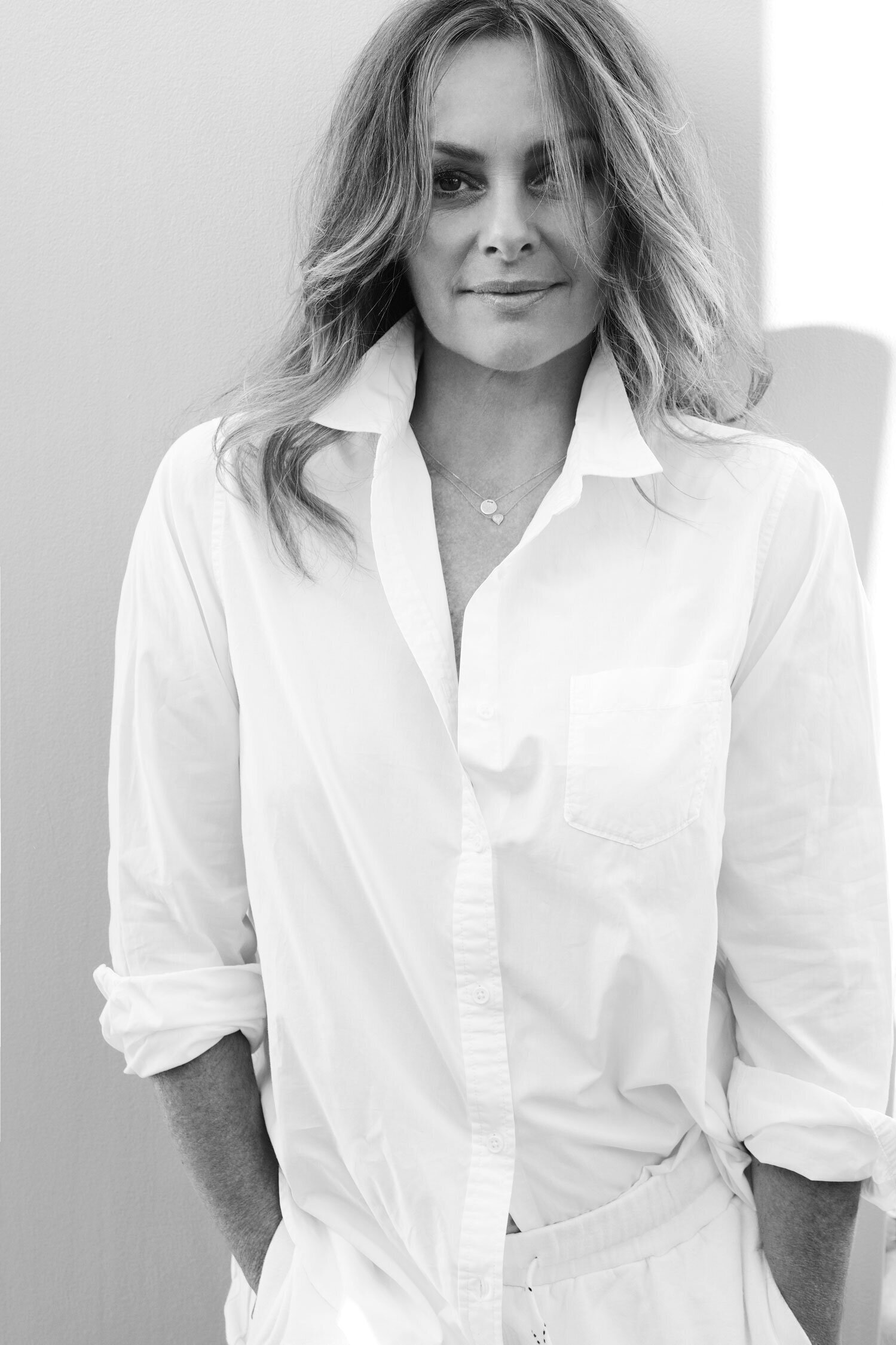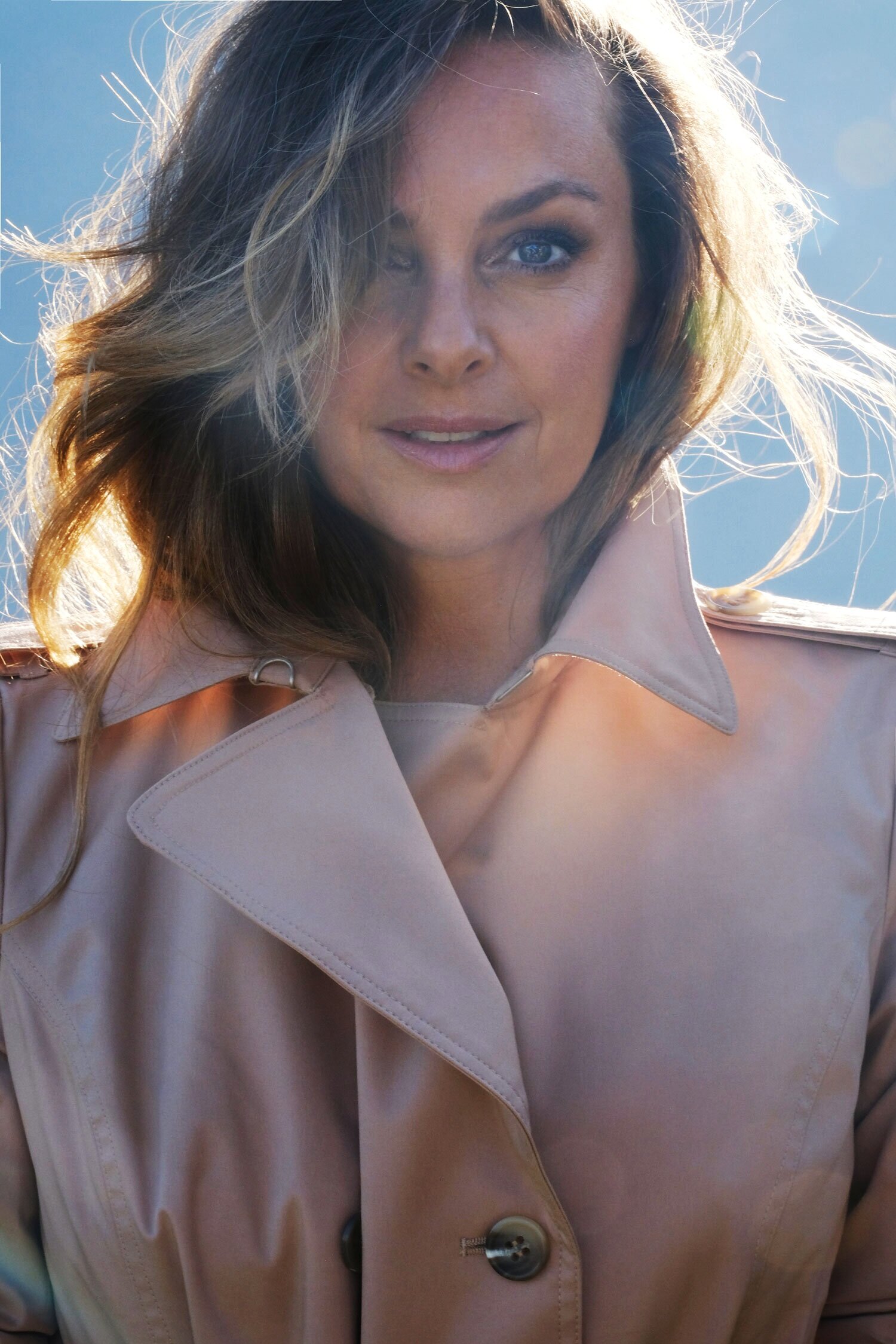“What The Hell Is This?”
It takes a moment to reconcile the fact that Alison Brahe-Daddo is talking about menopause. As an Australian “it” model of the ’90s, her name was synonymous with youth and its accoutrements: a checklist where everything was metaphorically, and actually, golden including her suntanned limbs, flowing hair and TV star boyfriend. But that was almost 30 years ago and Alison is – gulp – 50, now married to the TV star (Cameron Daddo) with three children (Lotus, 24, River, 20 and Bodhi, 14). She’s still beautiful, of course, but she speaks a lot more bluntly than she did in her modelling days.
“I’ve got to let that image of the 20-year-old go and be [okay] with what I look like right now, although I still have insecurities about who I was in my 20s. I’m looking at my body and looking at my face and going, ‘Holy fuck, do I even recognise myself anymore? I now have a major muffin top, I’ve got major dimpled thighs, I’ve got nanna flaps on my arms’ – but what am I going to do? Lament it? Am I going to fall apart or am I going to go, ‘Fuck it! This is who I am right now’, and own who I am, for my personality and what I can offer.”
After spending two and a half decades in Los Angeles – the pair relocated there as newlyweds for Cameron’s acting career – the Daddo family boomeranged back to Sydney three years ago. The move coincided with the onset of Alison’s perimenopause, which arrived less than gently. “I had thought that menopause was, your periods stop and that was it. You keep on going on with your life. [Instead] I started gaining weight at a rapid rate and having mood swings out of nowhere. I was also having feelings of loss and sadness and anger that I couldn’t trace to any incident.”
When she began researching the subject, she was aghast by the implicit message in the literature. “It was just an absolute wealth of depression and shame and negativity, and I was like, ‘What the hell is this?’” It has prompted her to write a book – due out in 2021 – on the subject. “I want women to be prepared for it and know there is a lot of positivity around menopause. If we can just shine more light on some of the good things that come out of it, it might not be something that, as women, we’re all dreading. I wanted to start a conversation about all of it, every part of it, but also focusing on the greatness of what happens to women during this time.”
“Faced with menopause and starting to feel all the physical symptoms and watching my body start to crumble, I was like, ‘Holy shit, I’ve got to do something!’ I’m now fitter than I’ve been in 10 years. ”
And here is the core of why Alison believes that every woman becomes more beautiful in mid-life. “There’s this emergence of themselves, of standing in their own skin, in their own power as a woman. I find, speaking personally, that I have been such a people pleaser my entire life. As I’ve aged through this menopause, I’ve really found myself going, ‘Fuck it. I don’t care.’
“What I care about is my passion, who I love, who I want to be with, and I can say so now. For the first time I am figuring out my voice and not caring so much about whether other people will like me or get hurt.
“I hear other women saying, ‘For the first time, I feel like it isn’t about how I look but who I am and that is so beautiful.’ You see this insecurity and superficialness drop away, and go, okay, this is 100 per cent me now. I am going to tell you exactly who I am and if you don’t like me, that’s okay.’ I think that’s a really powerful place and that’s the beauty of it for me.”
When she’s not working at a school assisting children on the autism spectrum and with learning difficulties, Alison is an ambassador for RizeUp Australia, which helps families impacted by domestic violence, and co-hosts a podcast, Separate Bathrooms and Other Handy Marriage Tips, with her husband. There she revealed that the pair are in separate bedrooms as a direct result of menopause, since she’s realised that a good night’s sleep – away from a snoring partner and enduring sweaty nights in solitude – helps her feel calmer. Cameron found the notion of separate bedrooms very confronting, since it didn’t fit in with his perception of a successful marriage. His reaction is one of the reasons why she’s including a chapter for partners in her forthcoming book.
“Menopause has challenged my and Cam’s relationship enormously, because of all the changes that I’ve been going through – physically, emotionally, mentally. The partners of menopausal women are a bit forgotten in that they sit there watching their wives change after so many years and go through a really rough time, and they don’t know what the hell is going on, either … It’s got to be rough. The whole thing is happening inside me and it doesn’t include you, yet you’re in my house, in my life and you’re therefore drawn into the changes I’m going through.”
In her case, those changes were severe. “The first year I moved here, I went into months of deep depression for the first time in my life, and it shook me deeply to be in this dark place that I felt I couldn’t get out of.” She managed to step out, slowly and methodically, by making a series of holistic changes. She saw a naturopath. She and Cameron both went to therapy. And she began exercising again.
“I had almost stopped exercising before I moved to Australia. I was working full-time, raising kids. I gave myself no time at all to take care of myself, my health, my fitness. Faced with menopause and starting to feel all the physical symptoms and watching my body start to crumble, I was like, ‘Holy shit, I’ve got to do something!’ I’m now fitter than I’ve been in 10 years. I’ve gone to dance classes. I do a lot of hiking. I’ve taken up swimming, Pilates and yoga. I started moving my body.
“… My favourite thing is just getting together with a bunch of women and talking and sharing. I want the book to have that tone to it. Like, ‘I don’t have it together. Let’s talk about this. This is what I feel; what do you feel? What helped you?’”
“And I began journaling again, which I’d done for many, many years before stopping. But now that I’ve been through those months of depression, it always feels like it’s a possibility again. I’m really aware now when I start to get down. And when I get to that place, I up my walks, my chats, or I watch a funny movie, read a funny book. There’s a myriad of different things I do to help myself.”
It’s just one of the reasons that she wants to open up the dialogue – in case other women can benefit from what she’s learned. “I thought, there are women out there in the same place as me, struggling with the exact same thing. How can we all come together … because my favourite thing is just getting together with a bunch of women and talking and sharing.
“I want the book to have that tone to it. Like, ‘I don’t have it together. Let’s talk about this. This is what I feel; what do you feel? What helped you?’ It’s not a self-help book in the sense that I know everything and I’m going to share it with you. It’s like, I’m struggling with this, are you as well? I’m writing from the perspective that I’m still being challenged – that I, for sure, do not have all my shit together.”
Words_ Rachelle Unreich
Photos_ Carlotta Moye
Hair & Make-up_ Craig Beaglehole, using Mecca Cosmetica
Fashion_ Trench coat by Sportscraft; striped T-shirt by Bassike; denim jeans by Levis; tracksuit pants by Bonds; white shirt by Uniqlo; white T-shirt by Calvin Klein; leather boots by RM Williams; jacket Alison’s own






